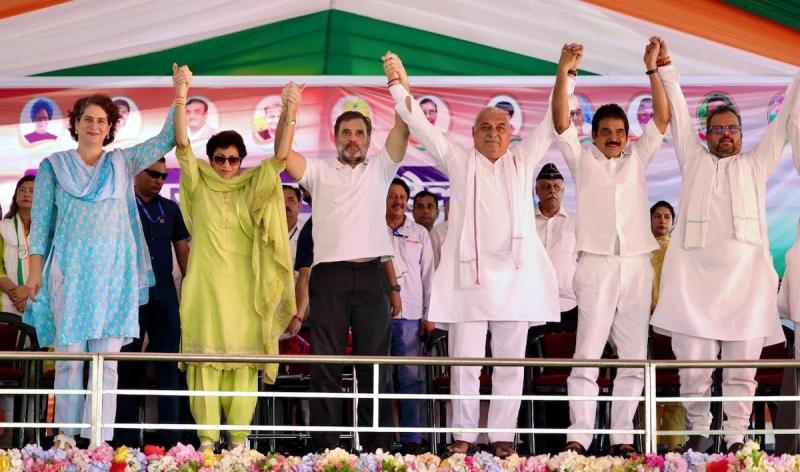
- galaxy
- 09 Oct 2024 06:12 AM
- Haryana elections 2024
The Bharatiya Janata Party (BJP) has made history in Haryana by securing a record third term, defying predictions from pollsters and political pundits alike. After a disappointing performance in the recent general elections, where the BJP lost five seats to Congress, the party recalibrated its strategies and ran a focused campaign aimed at retaining power and garnering pro-incumbency votes.
In the Lok Sabha elections held just six months prior, the BJP led in 44 assembly segments while the Congress-Aam Aadmi Party (AAP) alliance led in 46, with respective vote shares of 44% and 46%. This trend of declining support for the BJP in state elections gave Congress hope for victory, bolstered by alliances with wrestlers, farmers, and the Agniveer protests.
However, Congress’s defeat raises several critical questions:
-
Overconfidence: Despite favorable conditions, Congress failed to secure victory, demonstrating that the BJP maintains an advantage in direct contests. Complacency fueled by favorable media narratives led to a false sense of security.
-
Factionalism: Internal divisions within Congress, particularly among leaders Bhupinder Singh Hooda, Kumari Selja, and Randeep Singh Surjewala, hampered their campaign. Disputes over ticket distribution and a lack of unified campaigning contributed to their struggles.
-
Failure to Manage Rebels and Forge Alliances: With 29 rebels running against Congress, the party struggled to maintain cohesion. In contrast, the BJP managed fewer rebels effectively, demonstrating better internal discipline.
-
Limited Benefits from Vote Shifts: While Congress did capture a portion of the Dalit and OBC votes, the impact was limited by JJP's losses, which concentrated their vote share in specific regions, failing to translate into widespread electoral gains.
-
Silent Non-Jat Consolidation: The BJP's strategic appointments appealed to non-Jat voters, leading to a perception of Jat-centric politics within Congress. This division proved detrimental to Congress in key areas.
-
Congress's Inability to Dominate Jat Areas: Despite past successes in Jat-heavy regions, Congress failed to capitalize on its leads from previous elections, sharing the spoils with the BJP and independents.
-
Neutralization of Anti-Incumbency: The BJP effectively addressed local anti-incumbency by refreshing its leadership and candidates, while Congress retained many incumbents who faced dissatisfaction in their constituencies.
-
RSS Support for BJP: The resurgence of collaboration between the RSS and BJP helped strengthen their grassroots outreach, enhancing voter engagement ahead of the elections.
-
Split of the Dalit Vote: While Congress had previously captured significant Dalit support, its failure to maintain this narrative in state elections allowed the BJP to regain ground in reserved constituencies.
-
Pro-Incumbency Factors: Ultimately, the BJP’s victory reflects its effective governance and development initiatives, which resonated with voters. Beneficiaries of various government schemes backed the BJP, solidifying its position as a dominant force in Haryana politics.
In conclusion, the BJP's success in Haryana illustrates its adeptness at navigating complex political landscapes through a combination of strategic planning, internal discipline, and effective grassroots outreach, while Congress's internal challenges and failure to adapt contributed significantly to its electoral defeat.







































